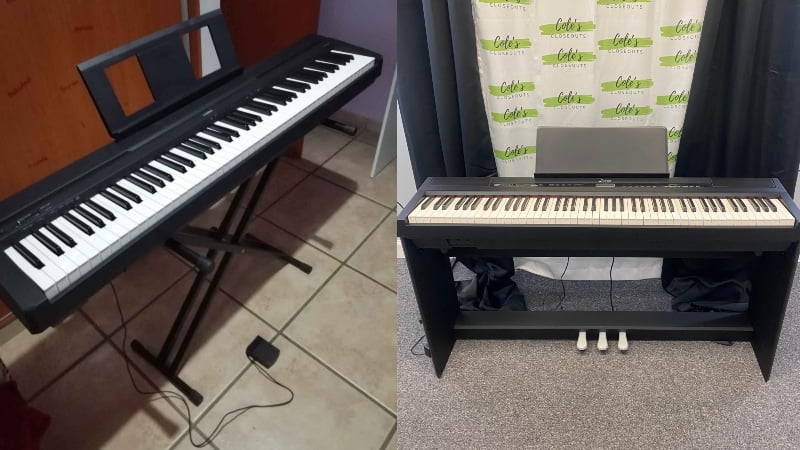The Donner DEP-20 is considered by many people to be the best beginner’s piano out there. However, the Yamaha P-45 gets many of the same praises from a lot of experts in the piano world.
So, which is the better model?
In this Yamaha P45 vs Donner DEP 20 comparison, I actually found the Yamaha P-45 to be the winner. This might come as a surprise, since the Donner model has more tones, polyphony, and piano effects. Despite that, the tone quality, piano features, and overall quality and feel of the Yamaha P-45 made it beat out the Donner DEP-20, but by a very thin margin.
Both of these pianos are great options for beginners, and you can learn why I found the Yamaha P-45 to be the better option in this in-depth comparison and review.
Yamaha P45 vs Donner DEP 20: Comparison Chart




Last update on 2025-04-13 / Affiliate links / Images from Amazon Product Advertising API
Yamaha P45 vs Donner DEP 20: The Differences
To figure out the winner between the two, I had to compare all the different features. And in the end, the score was 3-2 in favor of the Yamaha P-45. While the Donner DEP-20 had more voices, effects, and polyphony, I found the tones and the feel on the Yamaha P-45 to be much higher quality, which is why it was ultimately the winner.
Feel
The winner: Yamaha P-45
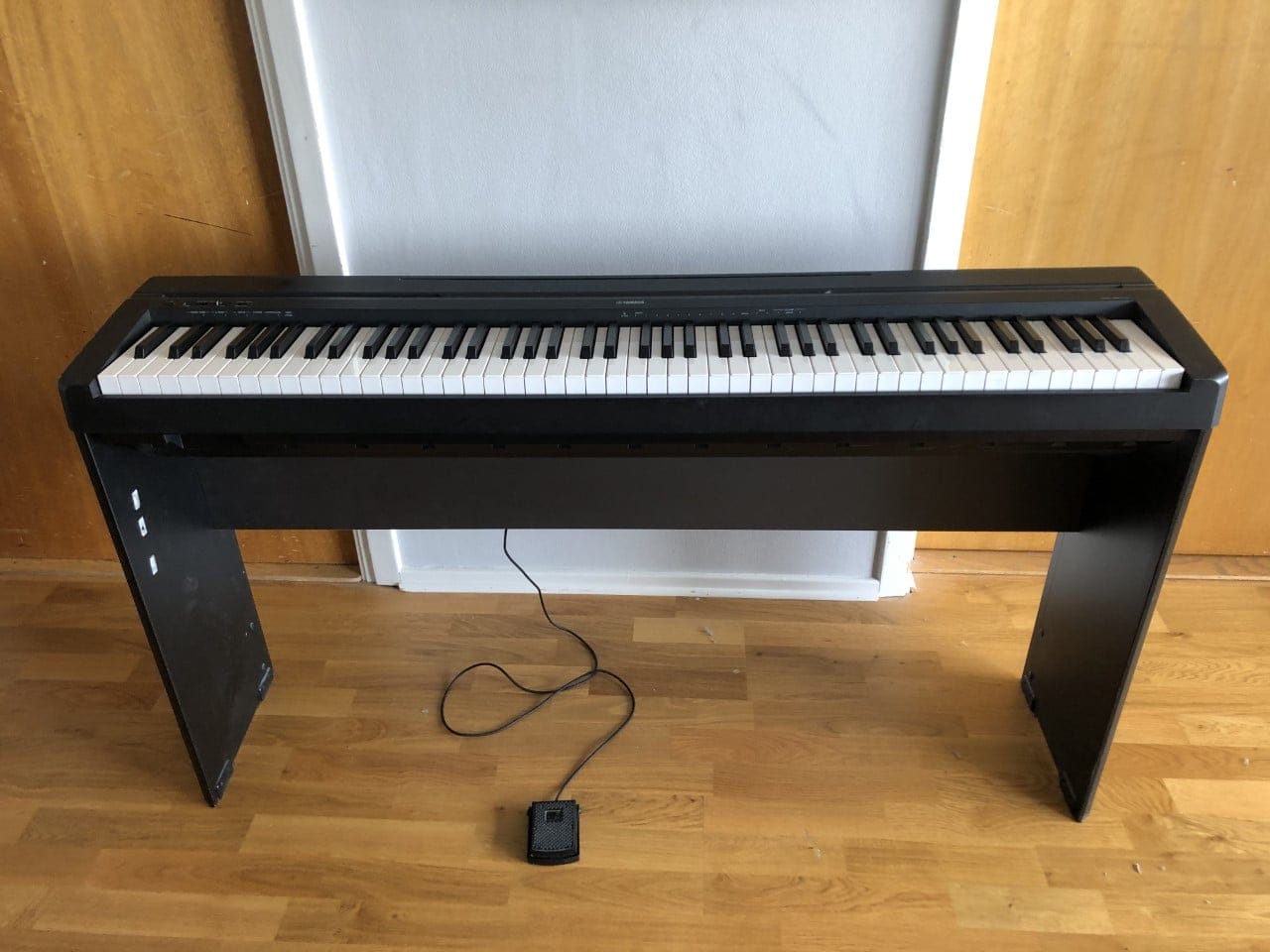
Since these are both beginner’s pianos, I wasn’t expecting much when it came to feel. However, I was definitely surprised by how realistic these two options felt compared to an acoustic piano. With that said, the GHS system of Yamaha is hard to beat out when it comes to hammer action, which is why the Yamaha P-45 won out over the Donner DEP-20.
+ Hammer Action
The Yamaha P-45 is equipped with GHS (graded hammer system) hammer action, which is one of the primary features of many Yamaha digital pianos. This system is meant to replicate the subtle differences in hammer action of an acoustic piano. So, when you play the P-45, you will feel that the keys on the left side have significantly heavier hammer action that gets progressively lighter as you move to the higher keys. This is the same way an acoustic piano is set up, and there aren’t too many brands out there that can replicate this as well as Yamaha.
The Donner DEP-20 also has a sort of scaled hammer action with heavier left keys and lighter right keys. However, the realism of the DEP-20 is nowhere near the Yamaha P-45. With that said, the Donner DEP-20 is still a great option with realistic hammer action, just not as good as the action on the Yamaha P-45.
+ Key Texture
The key texture of both of these pianos honestly leaves a lot to be desired. Since they are on the more affordable side of the spectrum this is forgivable. However, it would have been very nice if the pianos featured textured keys to mimic the ebony and ivory keys of an acoustic piano. This isn’t the case. Instead, both of the pianos feature glossy plastic keys, which don’t make too much of a difference, but any experienced pianist will be able to tell that the keys are made out of plastic. This could have been fixed with a simple coating on the keys, but that is sadly missing on both models.
Tone
The winner: Tie
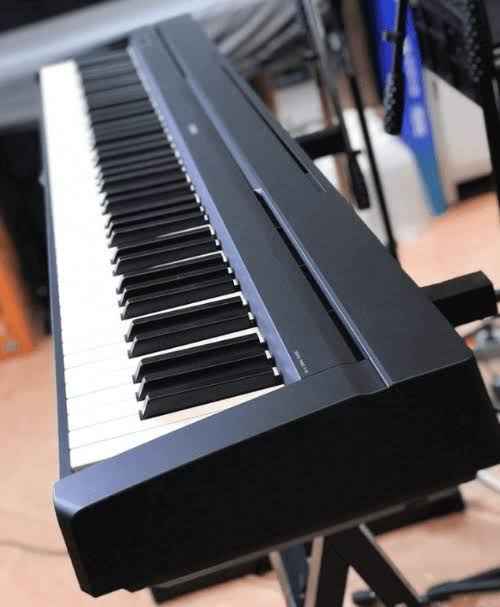
At first glance, it may seem like the Donner DEP-20 has a better tone than the Yamaha P-45 because of all the different voices it has. On top of that, both of these pianos use the same tone generation method. However, after testing out the different voices on the DEP-20, I found that they weren’t as high-quality as the ones on the Yamaha. When buying a beginner’s piano, quality is definitely better than quantity, which is why these two pianos are tied in terms of tone.
+ Tone Generation
Both of these pianos use the Yamaha AWM sampling method. This is one of the best ways to produce top quality voices through the standard sampling method. Instead of using low-quality samples with artificial and digital decay, both of the pianos use the best samples out there with completely natural decay. While this takes up more memory, both brands chose to give their pianos more storage capabilities so that they can play higher quality samples.
And to be honest, I found that the tones of the Yamaha P-45 sound better than the DEP-20 despite using the same tone engine. This may be because the piano was made by Yamaha, the better sound system, or my own personal taste. With that said, there are a bunch of pianists out there who agree with me on this, which is a clear testament to the quality and consistency of Yamaha pianos.
+ Sound Library
The Yamaha P-45 only has 10 different voices. While this may sound limiting, the library actually contains all the different instruments you’ll need, especially as a beginner. You have a variety of acoustic piano, electric piano, strings, bass, and even synth tones with the Yamaha P-45. This gives you a lot of versatility, and since all the tones are very high quality, you won’t be disappointed.
The Donner DEP-20 arguably has more variety than the Yamaha P-45 with over 238 different voices. Now, this may make it seem like the Donner DEP-20 is the superior option when it comes to tone. However, I was fairly let down while going through the different sounds on this instrument. While the piano and a couple of other voices were definitely top-quality, there were more than a handful that weren’t up to par. So, while you get more voices, they aren’t as high-quality as the Yamaha P-45, which is very important to consider when buying a digital piano.
Piano Features
The winner: Tie
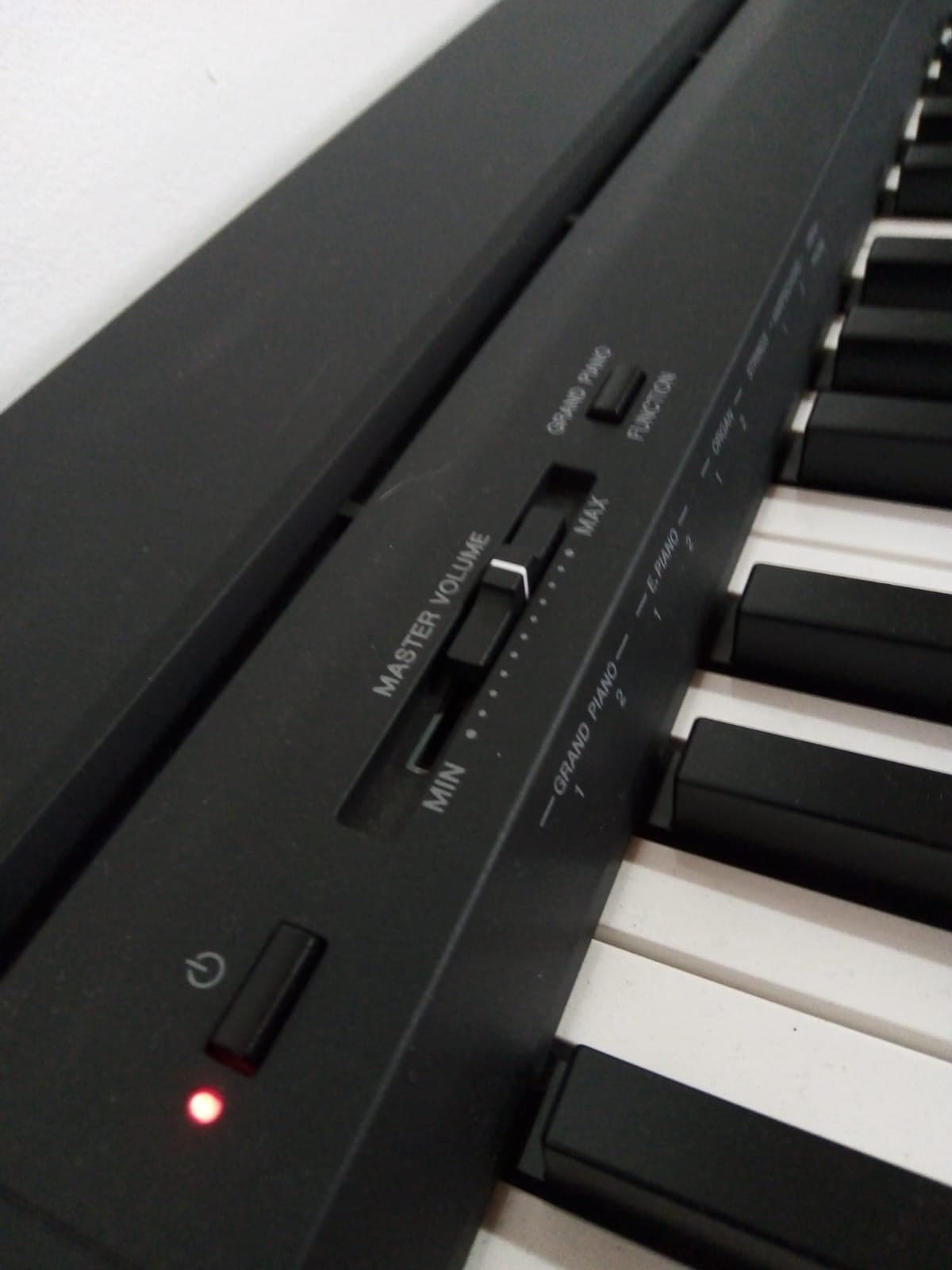
Another area where I found that these two models are definitely tied is in the extra piano features. Both the Yamaha P-45 and the Donner DEP-20 come with a variety of different playing modes, a couple of effects, and other features that make them great options for any beginner. Both of the pianos come with their own set of benefits that would be ideal for different types of pianist, which is why I found these two options tied when it came to the piano features.
+ Polyphony
This is the one aspect where the Donner DEP-20 beat out the Yamaha P-45. One of the main complaints I had with the P-45 is its 64 note maximum polyphony. Now, this is still good enough for a beginner, but if you start playing pieces with dense chords that require the sustain pedal, you might start running into some problems. The polyphony also becomes a problem when trying out the different piano modes that use a variety of samples every time you press a key.
The Donner DEP-20, on the other hand, has 128-note maximum polyphony. This is twice as much as the P-45, and it allows you to play denser chords with more notes. Granted, if you’re a beginner, you won’t need 128 note polyphony, but it’s still a nice feature to have handy.
+ Playing Modes
Both of these pianos have a couple of different playing modes that have different benefits. The most notable of these modes is lesson mode. With this mode, you can divide the piano into two different zones with the same voice and tuning. This is a great feature for piano lessons, as the teacher can demonstrate a bunch of different music techniques the exact same way you should play it without having to use the student’s side of the piano. This feature also comes in handy if you’re playing piano duets, as you won’t need two separate pianos if you activate this mode.
The Donner DEP-20 model comes with split mode, which is another useful feature. This mode also divides the piano into different zones, this time with different voices. So, for example, you can have a drum kit on the left side to play grooves and a piano voice on the right to play melodies and chords. This gives the illusion of playing two instruments at the same time, which is very useful if you’re a performer.
The extra mode of the Yamaha P-45 is layering mode. With this mode, you can load two voices at the same time which you can blend together. This mode offers a way for pianists to achieve unique tones that they won’t get when using just one voice.
+ Effects
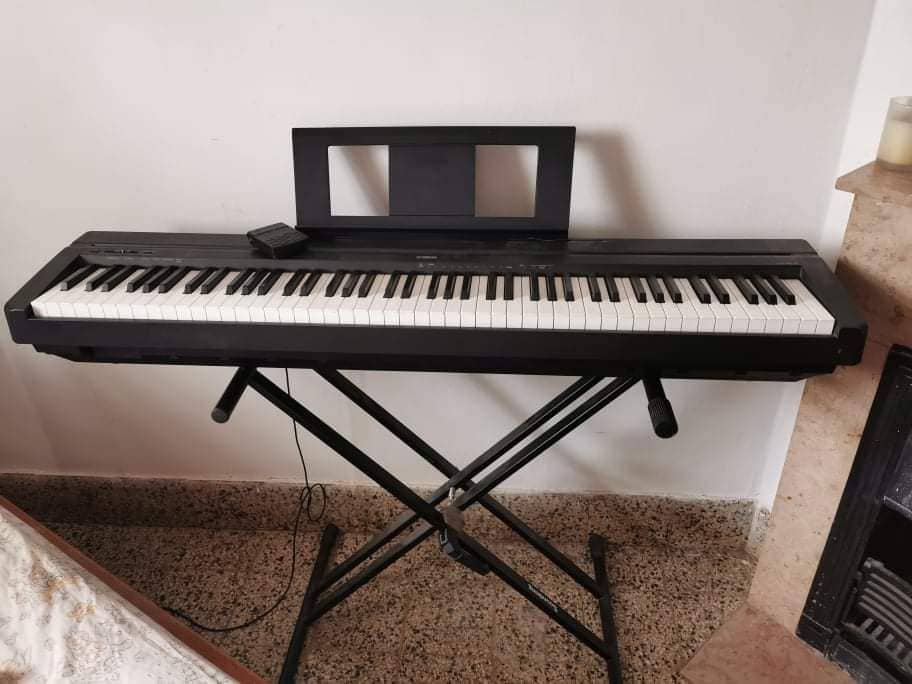
In terms of effects, the Yamaha P-45 only comes with reverb. However, this is really the only effect you’ll need as a beginner. With the different types of reverb on the P-45, you can add a lot of depth and texture to your tone, which allows you room for customizability. You can make it sound like you’re playing in a concert hall, auditorium, or any other venue by tweaking the reverb properly.
The Donner DEP-20 also has this feature, but it also has an additional chorus effect. As a beginner, you probably won’t use this effect too often. However, if you combine this effect with an electric piano voice or even a piano voice, you get a really unique sound that’s instantly recognizable.
Yamaha P45 vs Donner DEP 20: The Similarities
These pianos come with a lot of differences. However, they do share a couple of similarities as well. For example, these are two models specifically geared towards beginners. They are affordable, come with all the necessary features, and are some of the best entry-level digital pianos on the market today. On top of that, both of these pianos are affordable, which makes them great picks for anyone on a budget.
Since these pianos are designed to help beginners get used to playing a real piano, they also have graded hammer action. That way, playing these pianos will feel similar to pressing the keys on an acoustic piano, which is one of the most important features of any beginner’s piano.
And while they both have a bunch of different benefits, the Yamaha P-45 was the better option overall. With its better voice quality and more realistic feel, it would last any beginner pianist for a long while during their journey into music.
Quick Rundown of the Yamaha P45
- Includes the P45 Digital Piano, power adapter, sustain pedal and music rest
- 88 fully weighted piano style keys simulate the feel of an acoustic piano and provide a quality playing experience
- GHS weighted action is heavier in the low end and lighter in the high end, just like an acoustic piano
- Contains 10 different voices, including digitally sampled tones from real Yamaha acoustic grand pianos
- Dual mode lets you combine 2 voices together, like piano and strings, for an inspiring new playing experience. Tuning- 414.8 - 440.0 - 446.8 Hz
Last update on 2025-04-13 / Affiliate links / Images from Amazon Product Advertising API
Quick Rundown of the Donner DEP 20
- 🎹 【Full-Weighted 88 key keyboard】The digital electric piano is constructed by 88 full-sized hammer action keys with adjustable touch response. This 88-key weighted keyboard allows to adjust your desired playing style.
- 🎹 【238 Tones & 128 Polyphony】 The 88-key weighted keyboard loaded with 238 types of tone like Ukulele, drum, bass, etc. vividly presenting voices of different instruments, arousing your keen to learn music. The digital electric piano with 128-note max polyphony, players could distinguish tone clearly in Chorus & Reverb under various occasions.
- 🎹【Double Keyboard & Control Panel】This 88 key weighted keyboard provides dual-tone mode for combining two voices together, like piano and drum, inspiring to make a new creation. Panel includes sustain pedal, triangle pedal and audio inputs & outputs, perfectly used for music arrangement and an ensemble.
- 🎹 【Multi-Media Settings】This digital piano features with a backlit LCD screen for clearly showing chords names and notation and adjusting wanted tones, recording mode-MIDI, MP3 Player and two 25W amplifiers, bringing you richer and better experience of practice and performance.
- 🎹【Multi-Purpose 88 key keyboard】This streamlined 88-key piano is designed for rehearsing, learning and creating, practice or performance.
Last update on 2025-04-12 / Affiliate links / Images from Amazon Product Advertising API
Product Videos
Related Articles to Yamaha P45
- Yamaha P45 vs P45B: What’s the Real Difference?
- Yamaha P45 vs DGX-650: Is the DGX-650 Worth the Higher Price?
- Yamaha P-35B vs P45: Finding the Best Affordable Yamaha Piano
- Yamaha P45 Vs DGX-660: A Head-to-Head Comparison
- Yamaha P45 vs Williams Rhapsody II: A Head-to-Head Comparison
- Yamaha P45 Vs NP32: A Head-to-Head Comparison
- Yamaha P45 vs Williams Allegro III: Finding the Best Digital Piano on a Budget
- Yamaha P45 vs YPG 535: Which Is the Best Affordable Yamaha Piano?
- Yamaha P60 vs P45: Finding the Best Yamaha Portable Digital Piano
- Yamaha P45 vs P105: Should You Spend Extra for the P105?
- Alesis Recital Vs Yamaha P45: Which Offers Great Value For Money?
- Donner DEP-10 Vs Yamaha P-45: Which Digital Piano Is Better?
- Yamaha P45 Vs Korg B2: Which Digital Piano Fits Beginners Better?
- Yamaha P45 VS P115: Which P-Series Newbie Gives You More Value for Money?
- Yamaha P45 vs Casio CDP S100: Finding the Better Bet for Beginners
- Yamaha P45 vs YDP 103: Should You Get a Portable or Console Digital Piano?
- Alesis Recital Pro vs Yamaha P45: Which Should You Get As Your First Piano?
- Yamaha P45 vs Roland FP10: Which Entry Level Titan Takes the Top Spot?
- Yamaha P45 vs Casio PX 770: Should You Get the Portable or Console Digital Piano?
- Alesis Prestige Artist vs Yamaha P45: Can Alesis Hold Its Own Against the Popular Yamaha Model?
- Yamaha P45 vs P125: Why the Yamaha P125 Is the Better Pick for Pianists
- Yamaha P71 vs P45: Why the Amazon Exclusive P71 is the Better Digital Piano
Related Articles to Donner Dep 20
- Donner DEP-20 vs DDP-90: Which Donner Piano Wins Out?
- Donner DEP-20 vs DEP-45 Comparison: Is the Donner DEP-20 Worth The Higher Price Tag?
- Donner DDP-100 vs DEP-20 Comparison: Can the DEP-20 Beat Out the Donner Console Piano?
- Donner DEP-20 vs Alesis Recital Pro Comparison: Two Great Pianos Designed for Beginners
- Donner DEP-10 vs DEP-20: Which Is the Best Beginner Keyboard Under $500?
- Yamaha P71 vs Donner DEP-20: Which Is the Best Beginner Piano?
References:
- Yamaha P-45 88-key Digital Piano with Speakers: https://www.sweetwater.com/store/detail/P45BK–yamaha-p-45-digital-piano
- Donner DEP-20 Fully Weighted 88 Key Portable Digital Piano with Sustain Pedal: https://www.donnerdeal.com/products/donner-dep-20-beginner-digital-piano-88-key-full-size-weighted-keyboard-portable-electric-piano-with-sustain-pedal-power-supply
Lulacruza is an electronic folk duo operating at the junction of the hypermodern and the ancient. Our music weaves together hypnotic female singing, South American folk instruments and electronic processing, while channeling pulsating waves from the source of creation.
Lalucruza is also a community where you can connect with other music lovers to collaborate, exchange ideas and share knowledge. A platform for who wants to learns the basics of playing piano, guitar, drum masters’ technique, etc.. is the premise of our website.
